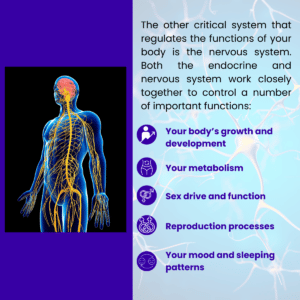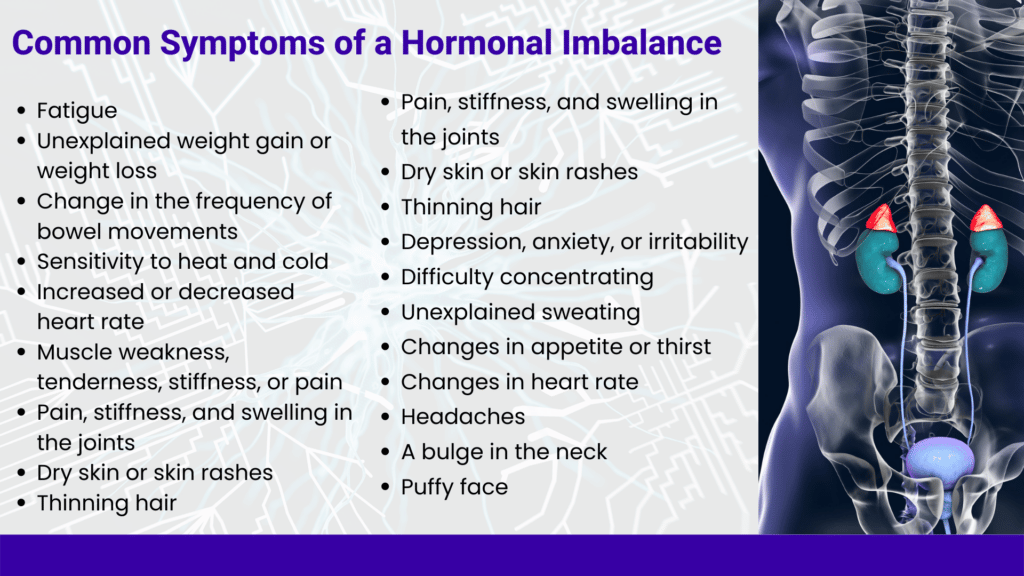Your survival and overall health depend on this administrative function of maintaining hormone levels over time and in diverse circumstances. Hormone testing has revealed that hormone levels fall as we get older, and hormone replacement therapies may help us keep our youthful vitality.
What Are Hormones?
 The body’s chemical messengers are called hormones. Through blood, they deliver crucial information to the cells. Typically, hormones work through receptors to only influence specific cells, or target cells. They are created by the endocrine glands and move to different tissues and organs via the bloodstream. Each hormone has a distinct purpose and delivers a crucial message to particular bodily regions. The hormone melatonin, for instance, is produced and released by the pineal gland. These circulate in the cerebrospinal fluid and blood around the brain, where receptors can pick them up. The body receives a signal to start sleeping when melatonin levels are higher.
The body’s chemical messengers are called hormones. Through blood, they deliver crucial information to the cells. Typically, hormones work through receptors to only influence specific cells, or target cells. They are created by the endocrine glands and move to different tissues and organs via the bloodstream. Each hormone has a distinct purpose and delivers a crucial message to particular bodily regions. The hormone melatonin, for instance, is produced and released by the pineal gland. These circulate in the cerebrospinal fluid and blood around the brain, where receptors can pick them up. The body receives a signal to start sleeping when melatonin levels are higher.
Hormones in the body are fundamentally in charge of regulating and balancing almost every major system. Your growth and development are affected by hormones, as are your mood, your ability to cope with stress, and how your body breaks down food. The best approach to find out if your hormone levels are negatively influencing your health is through hormone testing.
Types of Hormones
Endocrine glands are located throughout the body. These glands include the:
- Hypothalamus: controls thirst, hunger, sleep, sex drive, moods, body temperature, and the release of other hormones
- Parathyroid: controls calcium
- Thymus: controls the adaptive immune system
- Pancreas: controls blood sugar levels
- Thyroid: controls heart rate and calorie burn
- Adrenal: controls stress and sex drive
- Pituitary: controls growth
- Pineal: controls sleep
- Ovaries, in women: controls female sex hormones
- Testes, in men: controls male sex hormones
The body contains a variety of different hormones. One or more of these glands may be affected when you have a hormonal imbalance. The signs and symptoms you experience as a result will depend on the particular hormone that is out of balance. Major hormones present in the body include some of the following:
- Estrogen: controls sex drive in both men and women, and regulates the menstrual cycle in women
- Progesterone: influences the body’s changes through pregnancy
- Testosterone: controls sex drive in both men and women
- Cortisol: controls stress
- Melatonin: control’s the body’s circadian rhythm and sleep cycles
- Serotonin: controls sleep cycles, appetite, and mood
- Growth hormone: controls the reproduction of cells and their subsequent growth
- Leptin: controls appetite, signaling when you’re full
- Ghrelin: controls appetite, signaling when you’re hungry
- Insulin: responds to sugar in the bloodstream
Explaining Hormonal Imbalance
When your hormones are not generated at the appropriate levels, a hormonal imbalance results. Hormone imbalances can take many different forms. Sometimes an imbalance results from a hormone deficit, while other times there may be an overflow. The type of hormone that is out of balance will have a significant impact on how the signs and symptoms present themselves as well as any potential dangers.
Although there are a few frequent life stages, like menopause or pregnancy, that might result in a hormone imbalance, you can have this issue at any time. Hormonal abnormalities can affect both men and women. Hormone imbalances can occur in young people, adults, seniors, and even children.
There is no one approach to identify a hormonal imbalance because hormones and their functions are so diverse. Numerous conditions can be a sign that your hormones are out of whack. This is one of the reasons getting checked every so often is essential, especially if you start experiencing unusual symptoms.
What Causes a Hormonal Imbalance?
Depending on which hormone is involved, several factors contribute to hormonal imbalances. However, they are typically brought on by alterations in or issues with a gland that produces hormones. For instance, an unbalanced thyroid gland may either generate too little or too much thyroid hormone, which would speed up your body’s metabolism. Other potential causes of thyroid dysfunction include autoimmune illnesses, thyroid nodules, medicines, and, in rare cases, thyroid cancer. Age-related changes, such as menopause and andropause, as well as hereditary illnesses, stress, nutritional problems, or drugs can all lead to imbalances in male or female sex hormones, such as estrogen, progesterone, and testosterone. Unbalances in the levels of cortisol and other adrenal chemicals can be caused by excessive stress, a poor diet, aging, and some drugs.
A hormonal imbalance can be caused by a variety of different underlying factors. Each cause has an influence on your body differently and is related to various glands and hormones. Hormonal imbalances can be caused by a variety of illnesses and other situations.
- Diabetes
- Hypothyroidism or Hyperthyroidism
- Congenital Adrenal Hyperplasia
- Cushing Syndrome
- Addison’s Disease
- Turner Syndrome
- Prader-Willi Syndrome
- Pancreatitis
Testing for a Hormonal Imbalance
One of the most popular methods for determining hormone levels is a blood test. This test can measure the levels of thyroid, cortisol, estrogen, and testosterone. Because a hormone test for women will search for different levels of sex hormones than a test for males, you should get a test that is particular to your gender. Multiple hormone kinds can also be found with a straightforward saliva test. You may check your levels of estradiol, progesterone, and testosterone using a saliva test.
Your doctor may request an ultrasound if he or she has concerns about a certain gland in your body. Testing the pituitary gland, uterus, testicles, ovaries, and thyroid can fall under this category. There are additional imaging opportunities using an MRI or X-ray. In order to make a more accurate diagnosis, other forms of testing may frequently be required depending on the findings of earlier tests. Your healthcare professional can identify problems with a particular gland by doing a biopsy of the afflicted gland.
If a male is concerned about specific symptoms manifesting, a sperm count may give him further information. Women, however, might require a pap smear. Your doctor can identify problems that are affecting the balance of your hormones and posing a risk to your general health condition by looking for lumps, cysts, and other abnormalities in your reproductive organs.
So, you should check your hormone levels as soon as you have any doubts or concerns about any symptoms that may be disturbing you. According to the findings, additional testing may be necessary to definitively pinpoint the underlying cause of such an imbalance and follow the best course of treatment.
Treatment for a Hormonal Imbalance
Hormonal imbalances can be treated in a variety of ways. The specific hormone that is out of balance as well as the underlying reason of the imbalance will determine the final course of treatment that is offered to you. Such a change in hormone levels might occasionally be brought on by a life event like menopause. Your treatment would be brief in that scenario. However, you will need to pursue a longer-term drug regimen if you have a hereditary disease that results in a permanent hormonal imbalance.
A typical treatment for hormonal abnormalities is hormone therapy. Estrogen therapy is an option for women who are experiencing uncomfortable menopausal symptoms. Men with low testosterone levels or teenagers who are experiencing delayed puberty frequently opt for testosterone therapy. Those who have hypothyroidism may benefit from taking thyroid hormones. These hormone replacement therapy can be administered orally, topically, or even intravenously. By reviewing the findings of your hormone levels test, your doctor will assist you in determining the proper dosage. He will use this information to calculate the precise dosage of more hormones you will require to restore the balance.
The hormones utilized in these treatments can be of various sorts. In a lab, bioidentical hormones are created. They are chemically identical to those that the body naturally makes. For instance, a synthetic hormone with the same molecular structure as the one in our bodies is made using a molecule taken from soy or yams. Despite the fact that these hormones are created in a lab, they may be a great match for the hormones that you lack.
The compounded hormone is an additional type of replacement hormone. These medications are created specifically for each individual’s needs. Patients will receive a unique hormone combination in this manner, giving them the precise results they require. These have shortcomings while providing a personalized approach to hormone therapy. These drug mixtures have not undergone clinical testing, and there is no dose consistency with such personalized therapies.
Your best course of action if you believe you may have hormone imbalances is to get help as soon as you can. You might be surprised to learn how effective hormone therapy can be for a problem like weariness. Your first step to a healthier future can be to comprehend your hormone balance.
Natural Ways to Support Healthy Hormones
Even though you should always speak with your doctor if you have a hormonal imbalance, he may decide not to prescribe you any medicine to make things right. This is especially true if stress or poor diet are to blame for the imbalance. The likelihood of developing hormonal imbalances is generally increased in those who meet the following criteria:
- Being overweight or obese
- Smoking
- Consuming an excessive amount of alcohol
- Being exposed to pesticides and toxins
- Experiencing high stress levels
- Not sleeping enough
When you pay attention to your eating habits, exercise routine, and everyday routines, many of these risk factors are simple to alter. You can lower your chance of hormone imbalances and naturally maintain them if you stop smoking, drink in moderation, or stay away from pesticides.
Your hormonal balance can be greatly enhanced by altering your eating habits. For instance, you can reduce your body’s inflammatory response and support the maintenance of healthy hormone levels by substituting healthy fats like avocado and coconut oil for carbohydrates. Getting enough protein will help you manage the hunger-inducing ghrelin hormone. This makes you feel full, which encourages you to quit eating when it’s time to do so and maintain a healthy weight. By changing your food habits, you can significantly improve the balance of your hormones. For instance, by replacing carbohydrates with healthy fats like avocado and coconut oil, you can lower your body’s inflammatory response and promote the maintenance of balanced hormone levels. You can control the hormone ghrelin, which makes you feel hungry, by eating enough protein. You will feel satisfied as a result, which will motivate you to stop eating when you’re full and keep your weight in check.
A wonderful approach to naturally control your hormone levels is through exercise. Your ability to manage your insulin levels will improve with regular exercise. Additionally, it might assist you in coping with stress and fighting obesity, both of which are factors in hormone imbalance. By choosing to live a healthy lifestyle, you are resetting your hormones. These hormone imbalances, however, may occasionally result from more serious causes. Your doctor could feel compelled to start you on medication in that situation.


